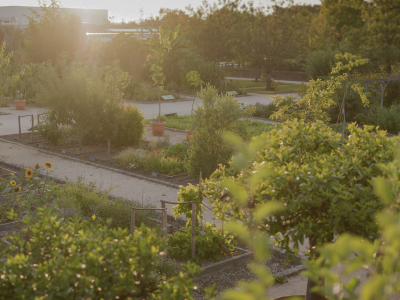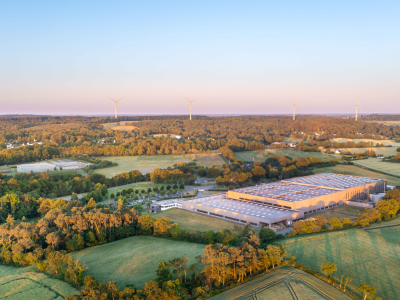SBTi approves Groupe Rocher's ambitious carbon trajectory
Groupe Rocher, the first international group to adopt the status of Mission Company, is pleased to announce that the SBTi* has approved its short-term carbon emissions reduction targets** , based on scientific data. This ambitious program aims to significantly reduce the group's greenhouse gas emissions, reinforcing its commitment to fighting climate change.
A sustainable trajectory based on a historic commitment
Convinced from the outset that carbon offsetting is not the solution, the Groupe Rocher is committed to a low-carbon approach. Since offsetting to ease our conscience is not an option for the Group, carbon sobriety quickly became an obvious choice, both in terms of viability and sustainability. It is indeed the radical transformation of these ways of acting that will enable companies to assume their role in the fight against climate change, and that must guide the actions of organizations towards this goal. This strategy is based on the direct reduction of energy consumption and the transition to renewable and decarbonized energies.
Groupe Rocher has been monitoring its carbon footprint since 2010, and has already reduced its CO2 emissions by 43% over the last five years on scopes 1 & 2, and by 32% on scope 3. Significant investments have been made, for example, to increase the proportion of renewable energies, which now account for 34% of the energy consumed by the Group.
Groupe Rocher is thus committed to a rigorous decarbonization trajectory for its value chain, validated by SBTi. The objective for 2030 is to reduce its carbon emissions by 42% on scopes 1 & 2, and by 25% on scope 3, compared with 2022 levels.

Marie Marache, Groupe Rocher Mission & Impact Director:
"I am particularly proud to see our ambitious carbon reduction trajectory approved in this way by SBTi. This validation confirms the relevance of our vision to guarantee sustainable development for our Group and its brands. To achieve these objectives, we have opted for carbon sobriety, and to exclude offsetting systems, which go against scientific consensus and do not encourage companies to change their business models."
Concrete actions and tangible results
To achieve its sustainability objectives, Groupe Rocher has defined a clear path to carbon sobriety, adopted by all its brands. This approach is based on collaboration with its stakeholders, a learning dynamic and continuous improvement across its entire value chain.
The Group is working to reduce its dependence on fossil fuels and increase the proportion of renewable energy used. Each site (industrial, tertiary, stores) deploys an Environmental Management System (EMS) to identify and deploy levers for reducing energy consumption. Investments are also made every year to acquire energy-efficient equipment and adapt industrial processes to optimize consumption. At the same time, the Group promotes the use of renewable energies, notably through the installation of equipment such as wood-fired boilers, solar panels and photovoltaic panels.
As part of its product innovation strategy, reducing the use of plastic, which has a significant carbon footprint, is a major challenge. The launch of rechargeable products is a perfect example. The Stanhome brand offers its customers a new refillable deodorant: by using 1 deodorant and 2 refills, nearly 50% less plastic is used than by using 5 conventional deodorants***. The use of less impactful materials is also a key lever. The Yves Rocher brand is one of the market leaders in solid cosmetics, allowing the use of cardboard packaging. Swapping a classic 300-ml Yves Rocher product for a solid equivalent, packaged in FSC-certified paper, reduces the packaging's CO2 impact by a factor of 5.
A Group Transport policy was formalized in 2023 to reduce emissions linked to this activity. The Group manages its transport flows in such a way as to reduce distances travelled, optimize truck and container fill rates, and use alternative energy modes of transport. A selection of committed partners and close collaboration with these transport suppliers support and accelerate this collective dynamic. This policy is in line with the FRET 21 approach, to which the Groupe Rocher is committed in 2020.
The "La Gacilly, Territoire Bas Carbone" project is an emblematic example of Groupe Rocher's decarbonization policy, on the scale of its historic territory of La Gacilly. Here, the Group is committed to reducing its carbon emissions by 75% by 2025 compared with 2019 on scopes 1 & 2, cutting energy consumption and maximizing the use of renewable energies. All this is made possible by numerous projects carried out on site (adoption of renewable energy sources, promotion of the use of wood from local and sustainable sources, encouragement of eco-friendly modes of transport, etc.) and thanks to employee awareness of the challenges of carbon sobriety.
*The SBTi (Science Based Targets initiative) is a climate action organization that defines and promotes best practice in science-based target setting and independently assesses corporate targets for achieving net zero by 2050.
**Available at https://sciencebasedtargets.org/target-dashboard
***Using 1 Stanhome Deo Smart 50 ml and two Stanhome Deo Smart 100 ml refills saves 48.7% plastic compared to using 5 Stanhome non-refillable 50 ml roll-on deodorants.










